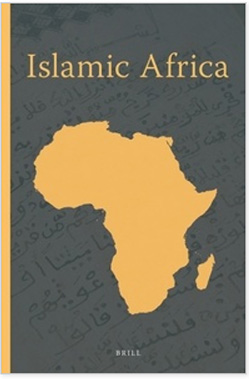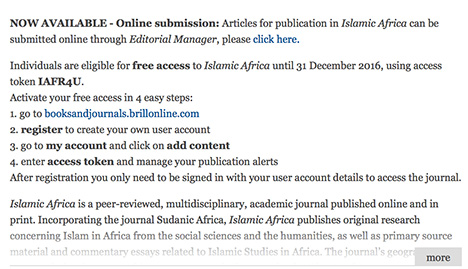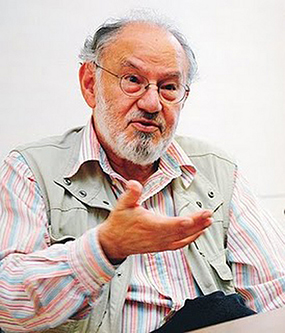
Check out an interesting podcast on Muslim writing on science fiction.

Check out an interesting podcast on Muslim writing on science fiction.
Brill has recently published a Handbook of Sufi Studies. One of the editors, Alexander Knysh, discusses the new volume here.
8 Rules of Engagement Taught by the Prophet Muhammad
Extremism ‘experts’ are everywhere these days. Assertions thrive about what Shariah law allows, especially when it comes to warfare and ‘Jihad’. Two very unlikely bedfellows, Islamophobes and extremists, have taken up one allegation, that Islam is violent, and run with it. They both misquote Islamic sources to prove their shared fantasies, and to good effect, with media outlets falling over themselves to give them a platform. This convenient lie has become the Blood Libel of the Muslims, which is spread by various groups to achieve their own agendas.
So here is a list of actual rules of engagement taken from Islamic law, together with their original sources. This is what forms the basis of what Muslims believe and follow. These 8 laws expose the ‘Islam is violent’ line as lazy and shamefully dishonest.
N.B. War is unfortunately an inevitable part of civilization and at times countries need to respond to aggression. Islam allows the use of force to stop evil and bring security to a country’s citizens therefore a set of laws pertaining to war has been laid out by the Prophet Muhammad himself.
What follows are mainstream laws of Islam as taught by the orthodoxy of the religion. This is what the vast majority of Muslims around the world observe as their religion. It does not mean however, that all those who claim to be Muslim actually follow orthodox Shariah laws. Such groups and individuals would rightly be labelled as heretics for inventing new beliefs that run counter to explicit statements found in original sources of Islamic law. Continue reading Rules of Engagement

Islamic Africa is a peer-reviewed, multidisciplinary, academic journal published online and in print. Incorporating the journal Sudanic Africa, Islamic Africa publishes original research concerning Islam in Africa from the social sciences and the humanities, as well as primary source material and commentary essays related to Islamic Studies in Africa. The journal’s geographic scope includes the entire African continent and adjacent islands. Islamic Africa encourages intellectual excellence and seeks to promote scholarly interaction between Africa-based scholars and those located institutionally outside the continent.

For anyone doing research on the Middle East for the past two centuries, there is an incredible archive online. Details below:
Below is a list of Open Access historical newspapers and other periodicals in Middle Eastern Studies.
Most titles on the list have been digitized by independent projects across the globe and may not have been fully cataloged. It is often difficult to find and access them on the web or through catalogs such as HathiTrust, AMEEL, Gallica, Revues, WorldCat, etc.
We welcome your comments and suggestions of additional titles to include. Please use the comment feature at the bottom of the page.
For the list of active Open Access journals follow this link:
Alphabetical List of Open Access Journals in Middle Eastern Studies
132 titles as of May 14, 2015.

Thinking About Tradition, Religion, and Politics in Egypt Today
by Talal Asad, Critical Inquiry
I have used the term “tradition†in my writings in two ways: first, as a theoretical location for raising questions about authority, time, language use, and embodiment; and second, as an empirical arrangement in which discursivity and materiality are connected through the minutiae of everyday living.[1] The discursive aspect of tradition is primarily a matter of linguistic acts passed down the generations as part of a form of life, a process in which one learns/relearns “how to do things with words,†sometimes reflectively and sometimes unthinkingly, and learns/relearns how to comport one’s body and how to feel in particular contexts. Embodied practices help in the acquisition of aptitudes, sensibilities, and propensities through repetition until such time as the language guiding practice becomes redundant. Through such practices one can change oneself—one’s physical being, one’s emotions, one’s language, one’s predispositions, as well as one’s environment. Tradition stands opposed both to empiricist theories of knowledge and relativist theories of justice. By this I mean first and foremost that tradition stresses embodied, critical learning rather than abstract theorization. Empiricist theories of knowledge assert the centrality of sensory experience and evidence, but in doing so they ignore the prior conceptualization carried by tradition. My sensory experience is incommensurable with yours. It is only through language (integral to a shared form of life), and the conceptualization that language makes possible, that we can develop argument and knowledge as collective processes. Critique is central to a living tradition; it is essential to how its followers assess the relevance of the past for the present, and the present for the future. It is also essential for understanding the nature of circumstance, and therefore the possibility of changing elements of circumstances that are changeable. Relativist theories of justice assert that “justice” is simply the name for the norms that actually guide and regulate a people’s form of life. And yet what other people consider to be justice is part of the circumstance that confront the followers of every living tradition. As such it constitutes a challenge to every critical tradition, an invitation to change contingent aspects of one’s tradition, or of the circumstances in which it is embedded, or both. This is not a challenge of abstract theories but of embodied (and yet criticizable) ways of life.
For the rest of this article, click here.

The Library of Congress has a very nice website with online resources regarding its collection of Near Eastern materials.